Clear As Ice?
The 10 Phases of Denial That We Just Went Through & Thoughts On Not Going Off the Deep End
Well…
It happens to just about everyone.
You start out loving everything he does, but then something happened.
Something is off.
You shake off the feeling for a moment. It must be a mistake.
It couldn’t be. It must have been the fault of his aides. He must have done it under duress. He must not have really “meant” it…
But then your denials are backed by weaker and weaker arguments, and they get shakier and shakier, harder and harder to make until, one day, you just can't deny it anymore; you've become "red-pilled" on the Pope.
If you’ve gone through this experience over the last few days, you’re probably feeling deja vu.
This didn’t just happen once. Now, for many of us, it’s happened twice.
We all wanted a certain narrative to be true about the new Pope, and we only amplified those stories and chose to believe the facts we wanted to be true and disbelieved the things we didn’t like.
I admit I was part of it this time around for the first few weeks.
I believed in the secret Cardinal Burke / Leo-Anon (Q-Anon but about Pope Leo) supposed deal on tradition and the Church.
Yes, it was a psy-op, aided by Pope Leo XIV’s far more traditional and serious styling (or what we could call strategic branding choices), but it was primarily many of us psy-oping ourselves.
Like many of you, I felt the mask drop and a far more concerning reality unfold with Fr. James Martin’s meeting with the Pope. And things only got worse a few days later with the “LGBT pilgrimage” in the Vatican.
But the last few days have grown even wilder, with the recent pop concert in the Vatican, Leo making, well, sketchy statements on abortion and the death penalty, defending Cardinal Cupich’s scandalous award to Senator Durbin, and then engaging in a wild ecumenical anti-climate change prayer gathering that is very reminiscent of the Pachamama prayer service of Francis’s pontificate even as bishops around the world continue to crack down on tradition and prioritize liberal and mangerial banalities.
We should hold out hope—yes, but it now seems pretty obvious where this is headed. It’s as clear, we could say, as ice, though of course, surprisingly, the felt banners have now become plastic tarps for the new liturgical service of planetary justice. (The Antartican Rite?)
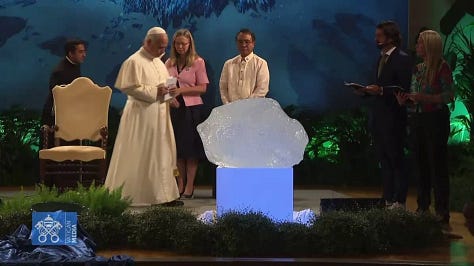
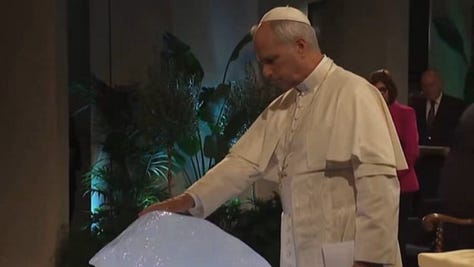
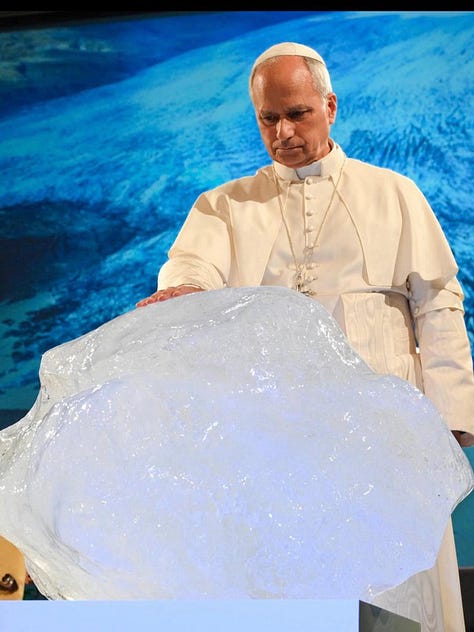
Popesplaining is now back, and with a vengeance (see Mike Lewis, Pope Respecter, and The Modern Boethius for examples), as is a more united traditionalist front, with the alliances temporarily wrecked in the uncertainties of the last few months seeming to be mending
A certain dam of illusions has broken in our minds—almost all the mimetic frame, the opinions of our peers that motivate and sway our own views have shifted all at once, both on politics in general and on Church “politics”, or, more properly, health, becoming, just as most of us were by 2018 around the time of Archbishop Vigano’s letters, “redpilled.”
We’ve all gone through the stages of denial, coping, and reconciling ourselves to reality in hyper speed over the last few months, repeating, in most ways, the stages we all passed through in trying to “understand” the Francis pontificate.
And I’m not talking about quote “climate” quote “denial”:
Having written a post last year about the “stages of denial” with regard to previous Church history, I thought it would be useful to write an update on what we’ve all just gone through together—as well as some thoughts on the tempting paths to come that we should avoid taking lest we fall, as so many did during Francis’s pontificate into complete despair (Steve Skojec, etc., and some personal friends of mine) and lose faith entirely in Christ and the Church.
The Stages of Cope
1. The new Pope is awesome and will singlehandedly save the Church:
Let’s try being positive, they said. It will turn out better than we thought in four months, they said. Just give him three months to settle into the job, they said… (and, I admit, I hoped!)
This view:
Lasted a few years. (Pope Francis)
Lasted about four months for most of us (Pope Leo XIV)
2. Oh, liberal media (and Fr. James Martin) are at it again, making up things the Pope said. Even more reason to support him:
They're just, uh, making up a false "spirit of Pope Francis” or a false image of “Pope Leo”… They’re bringing up the past of the Pope, not the present, and didn’t you know that Cardinal Prevost is now completely different from Pope Leo XIV? We can’t judge someone’s views by what other people say about him or by what he said two years ago…
3. Well, he said... something... but he's being misinterpreted:
Hmm, maybe he does need to be more careful when he does interview with people with bad recording equipment, but there's no real problem here. We just need to learn how to use the proper decoder key, or something.1
Ok, but then there's this week's interview... Hmm.. perhaps what he really meant was…
4. He must be tired. Oh, why does he bother to give interviews like that? Doesn't he know that doing that when you're tired is ambiguous:
They're just off-the-cuff remarks. Don't pay attention to those. Only pay attention to these over here... When the Pope met Fr. James Martin, it was because his schedule was being planned for him, and he just had to because the optics would have been even worse if he didn’t.2
But then you make the mistake of picking up a written formal document, a letter or exhortation in the Pope's name... And your dreams of explaining the situation away easily are dashed again.
(at this point) Popesplainers and Realists part ways!
Let’s All Say Goodbye to the Popesplainers.
Goodbye Popesplainers… It’s been nice knowing you.
5. Well, that thing I don't like was written in his name, but he probably didn't write it personally. The Church is a massive bureaucracy:
The things we don't like couldn't possibly be his fault. There was surely a ghostwriter behind everything we don't like. Surely? Please let it be so! He only used the word synodality because the last speechwriter is still aroi
This argument works for you until, again, you make the mistake of listening to the latest interview with the Pope, where he talks about doctrine maybe changing after our attitudes do..
6. He's a good man with bad advisors.
Just like with King George or Donald Trump, it's really Parliament or the Presidential Cabinet or the donor class (or here the Curia) that's to blame. Fix them and they'll stop interfering with the good intentions of the King or President (err Pope).
This is a really comfortable take. You want this one to be right. You want the Pope to be a simple, easy man to understand, with everything you don't like being easily explained away by reference to a blurry "bureaucracy" that was behind everything you don't like. But sometimes you're forced to consider that the Church is in a more complex environment. There are internal politics, yes, but there are also more complex external politics. (And there may be some truth here… still. Skip to the end!)
7. He's being purposefully ambiguous but for very good reasons:
But in such a way as not to "really" be responsible. He probably has some "misguided", but at least partially justifiable reason, like preventing the German bishops from "officially" going into schism or something. He's like a modern-day Emperor Charles V, the last time the Germans went into schism, trying to preserve unity in the Church with compromising wishy-washy like the Augsburg Interim.
He may have made some sketchy appointments, but at least he also made some counter-nominations and said a few clearer things.
He's being balanced. He’s trying to bring about unity and peace in the Church.3
But this position is untenable to hold for very long. Most, having been through the last few weeks, have moved on. It's now on to a very, very traditional take for traditionalists...
8. It is a product of the time in which he was ordained, but it isn't really his fault. He was taught wrong. DOWN WITH VATICAN II!
This stage is a popular one for traditional Catholics to take. Pope Francis Leo XIV is a good, well-intentioned man shaped by very poor circumstances. He was taught wrong but has good intentions...
And this take might hold you for a while in this position. But, eventually, you get restless. You want to really know what's happening. And so, you plan to log on to OnePeterFive.com for a little history lesson but are then distracted by the latest news coming out of Rome (or your local diocese), and you throw up your hands in confusion. Popesplaining is well nigh impossible now, at least if you want to stay intellectually honest.
9. Well, he is doing awkward things, but that’s ok, because it’s not magisterial, it’s not official, it’s not confirmed in… Alright, I give up…
Now you really are confused—and restless—and angry. Was it Vatican I that was the problem? Was it Newman? Was it John Courtney Murray and the CIA that led us to the current situation? Was it Pius IX? Was it Leo XIII?
On the practical side, you’re even more confused. You’ve now reached the level of debate where it’s no longer an intellectual exercise, but a very practical one. Can you stay in the Church? Do you need to join one of the, err, independent movements? Must you become a sedevacantist? Must you become Orthodox? Should you, on the other hand, throw up your hands in confusion and despair in the other direction and join the popesplainers you left behind weeks ago?
10. Off the Deep End?
And what comes after this?
Of course, for some, the step is becoming Orthodox, becoming a sedevacantist, etc., or—for some—leaving the faith entirely. The temptation to take those steps, I know, for many of you, is real. Too much has gone wrong. The position of tradition, of the Faith within the Faith, seems too dark. The prelates seem too lost, too weak, too compromised, to fix the situation.
Scrupulosity from facing a double Pascal’s Wager of feeling like their actions will be condemned either way, however, makes a lot of Catholics fearful of taking one side (the sedevacantist route) or the other (staying in the so called “Novus Ordo Church:) and instead leads many of us to “fence sit” at the halfway house of a certain sort of ambiguous relationship to the Church and Church authority—with, worst of all, often a negative, hopeless outlook on the future of the Church. Fear, as I feel is hitting many of us really hard right now, makes us paranoid, confused, and causes us to be gripped over time even further and further into despair.
What is to be done?
What should we do? What is to be done?
I don’t have perfect answers. I have a few thoughts here, though on things, believing as I do that the Church, while wounded, remains Christ's body, needs to be done:
There needs to be a major clean-up of the hierarchy and the Vatican, a Department of Vatican Efficiency to eliminate the bureaucratic stranglehold on the faith.
But before we can push back enough to achieve that, we need to remember that the Pope is not preventing you from achieving holiness.
Sure, it may be harder in some ways. Sure, there are causes of confusion and scandals, but were most of us really trying ten years ago before Francis? Some of the bishops are making it harder to access the sacraments? But are we trying and doing our part today?
If yes, and if we are trying more than we were ten years ago, then we're doing quite well, and maybe the confusion we've encountered in the Church helped us realize the need to try harder.
If we're not trying, then we have no one to blame but ourselves.
Fixing the current moral and liturgical confusion and adding clarity to the definitions of Papal infallibility and primacy to account for ages such as ours is probably a job for the next Council.
Fixing ourselves is our job.
At our Judgement Day, we all hope we’ll be right as to our particular response to the troubles in the Church. But we will primarily be judged for the charity or lack thereof of our response, and not for the minutiae of knowledge of canon law, nor for the sins of our peers or their failure to discern the crisis perfectly.
There is a lot of animus amidst trads right now, with a big divide between so-called “mad trads” and “glad trads” or “realists” versus “accommodationists.” We disagree with eachother on what sort of response we must make to this crisis. I think there are errors in the sedevacantist (and even the SSPX) position, but having had many conversations with their attendees, I’m not going to condemn them, or at least all of them. Neither will I condemn all the Popesplainers, even as I now think many of their efforts are hilarious, counter-productive, and even dangerous. I may continue to disagree with both sides, but our focus must always be on ensuring that we are preaching for the sake of the truth and not for our own self-aggrandizement, likes, or pride. “Love covers a multitude of sins,”4 and perhaps even those fellow Catholics who have responded differently than we to the present crisis have hope of salvation as well. We must certainly hope the same for ourselves.
In short, as much as Chris Jackson has disagreed with Dr. Kwasniewski recently, both would agree that the answer is that we need to be Catholic:
The only answer to the dilemmas of scrupulosity that force so many of us into stasis and inaction or into anger, hatred, and division against our fellow faithful Catholics is that charity matters more than getting our response perfect. Charity leads us to tradition and to the Church, as the best way to sustain it, and perfect love drives out fear, but we do have to admit that scrupulosity is a driving force for many people. While the fear of the Lord is one thing, I don’t think this is it. Our actions done in the Faith and to preserve the Faith can’t be motivated merely by fear.
We are not “R&Rs” or “mad-trads” or “the resistance” first. We are Catholic. The example of St. Catherine of Siena, as I have often mentioned, praising the Pope for what he has done right, while also critiquing him—and pushing back—hard!— when necessary yet not making our lives fully centered on the hierarchy’s whims either, as Chris Jackson argues below (and Dr. Kwasniewski also would agree), remains the best advice. Of course, there is a lot to critique right now, but that’s about the only thing we can do, other than wrecking our lives by willingly choosing despair.
The popesplainers will now popesplain, but now that the mask appears to have dropped, and things have become clearer since the James Martin meeting, we can all unite again around the need to push back and push for solutions to the current mess. The real enemy is the bureaucratic anti-Church built up within the Church that is trying to choke out the faith with its WEF globalist ecumenical intercetional nonsense, and we can at least agree on fighting that. Let’s hope and pray that that’s what the recent wild news in the Vatican brings us closer to doing exactly that.
May our icey hearts of stone “melt” and mellow with the fire of Divine charity!
P.S. I like Stephen Kokx’s take here. I’ve disagreed with him before, and still do on how pessimistic our current situation is, and have made pretty uncharitable, unjustified references to him in the past, which I apologize for, but he seems spot on here:
1 Peter 4:8



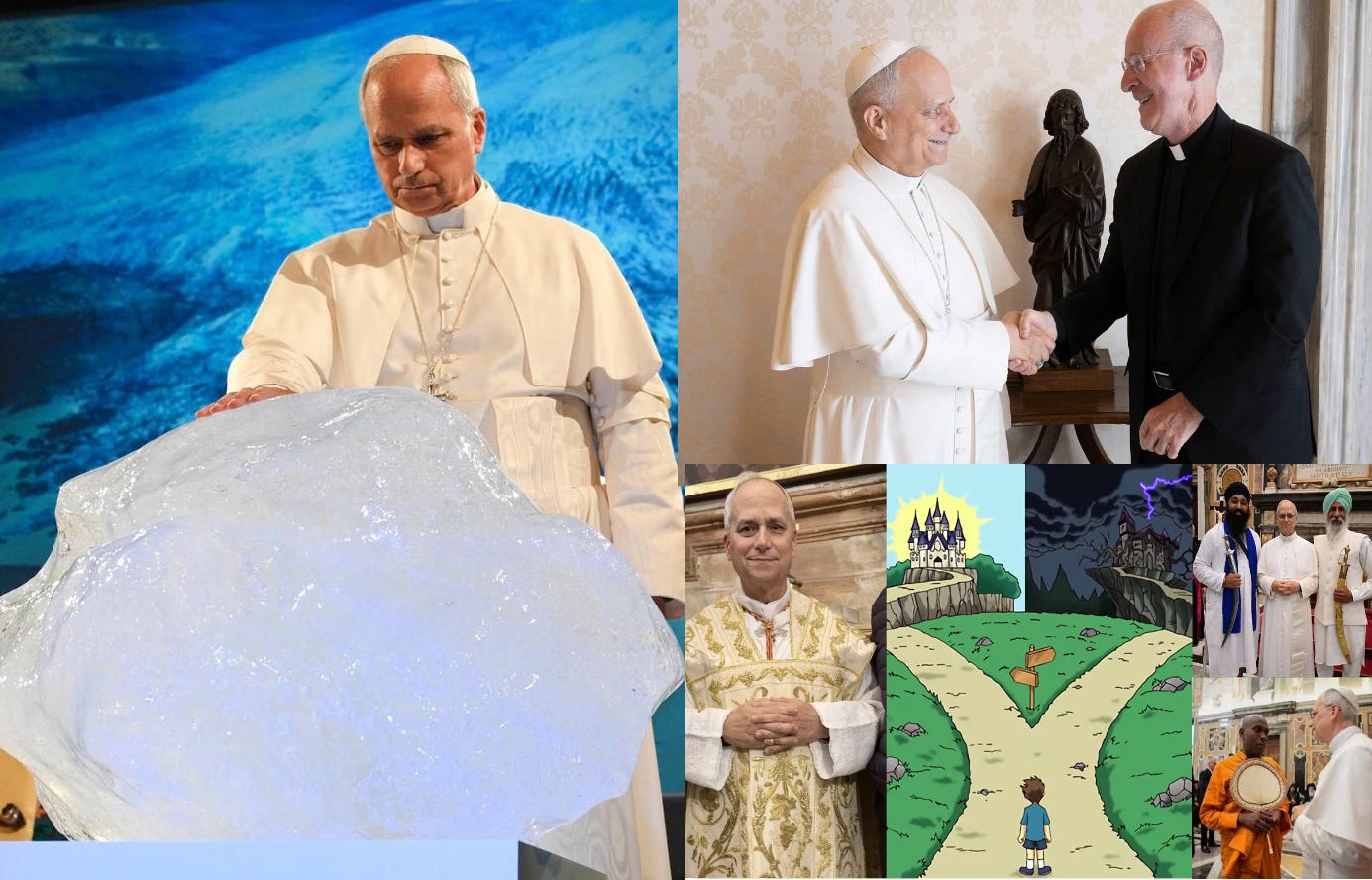
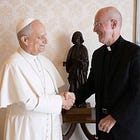
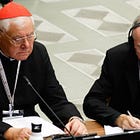

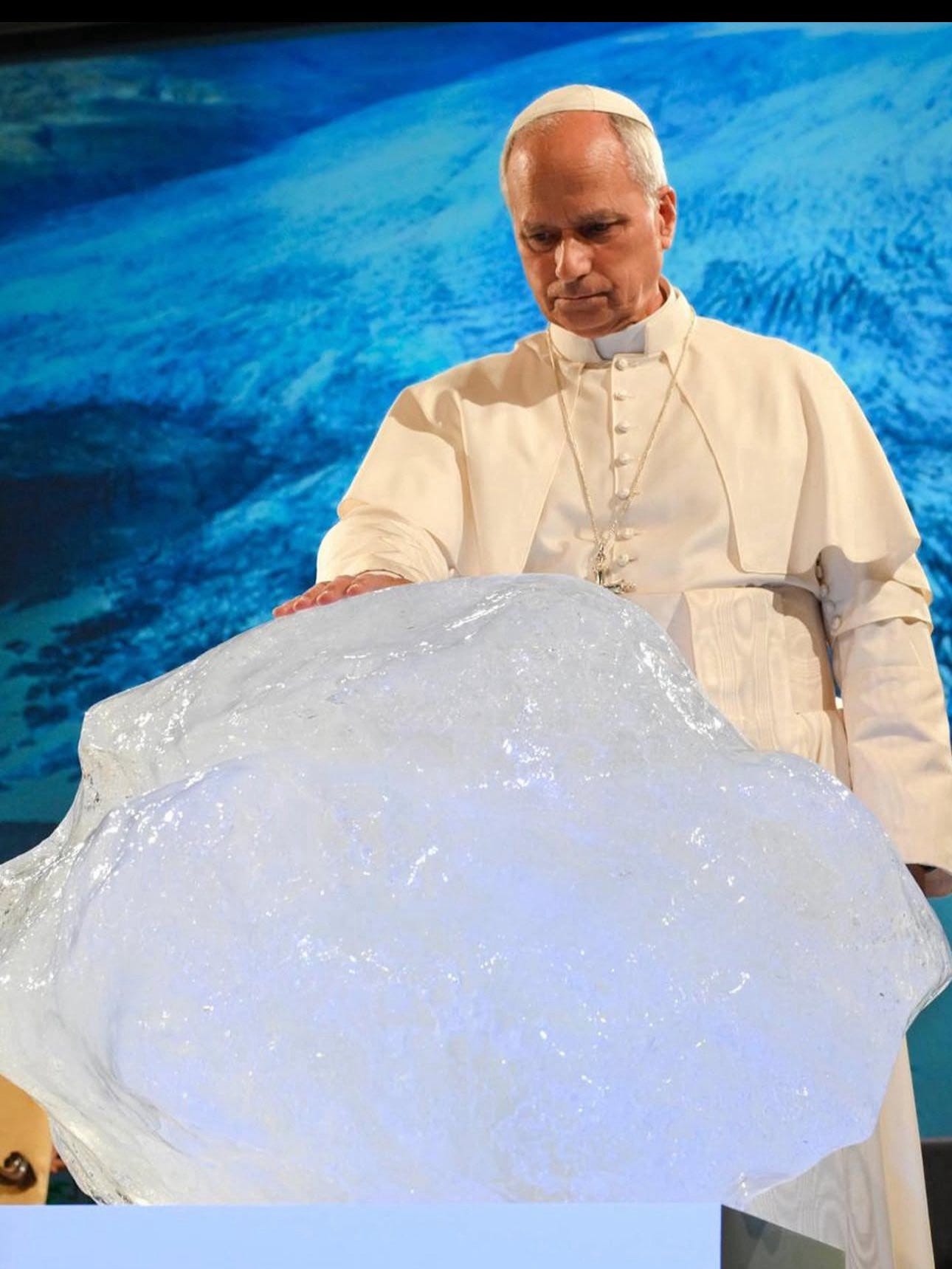

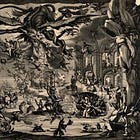
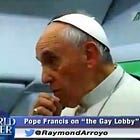

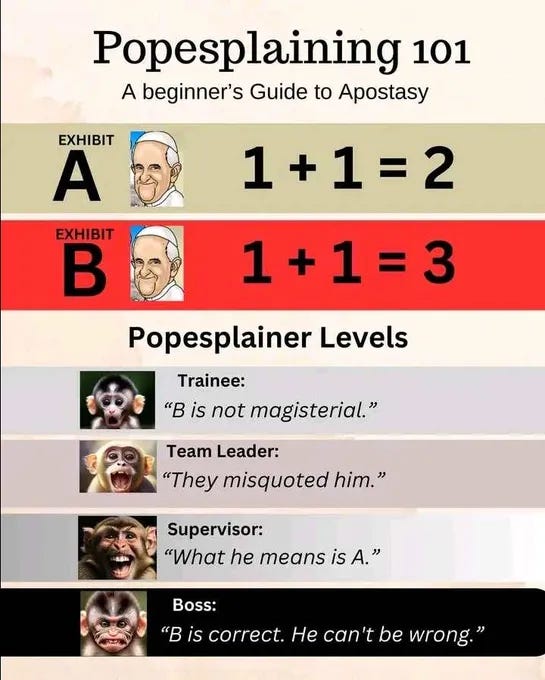
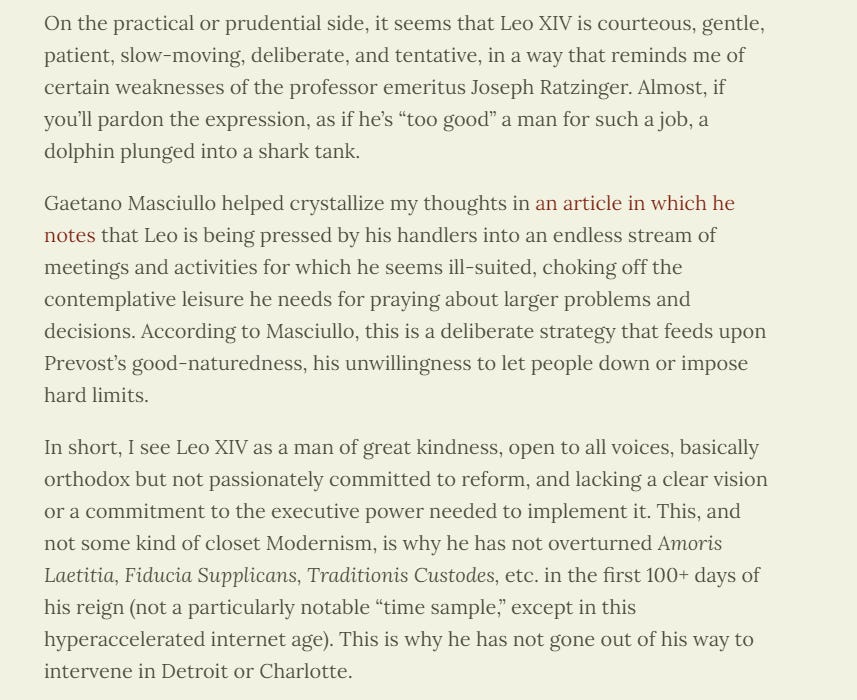
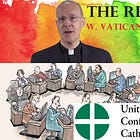



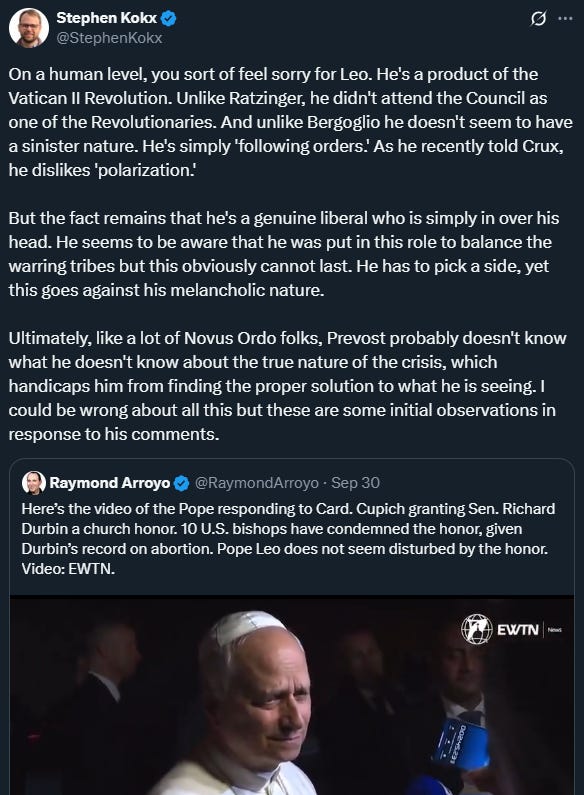



It's like a Coors lite advert, it's embarrassing
To me, it now seems obvious that the office of bishop of rome is a puppeteer’s hand on which some fellow sits and it doesn’t really matter who.